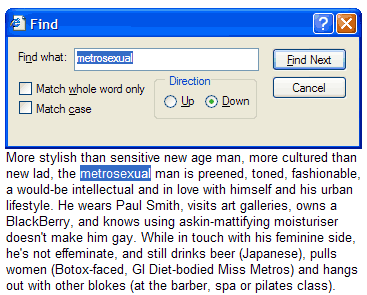|

FROM THE EDITOR
 In
this Issue In
this Issue
 Contributors Contributors
 Letters
to the Editor Letters
to the Editor
 Write
to Us Write
to Us
 Spread
the Word Spread
the Word
 Back
Issues Back
Issues
 Index Index
FEATURE
 How
professional do you How
professional do you
want to be?
COLUMNS
 Language
Interference Language
Interference
Romanian and English –
a mediated partnership
 Focus
on Language Study: Focus
on Language Study:
Introduction
Metaphor
UK version ¦ US
version
 New
word of the month New
word of the month
New phrasal verbs
 Corpora
tips Corpora
tips
The Web as corpus:
using media sites to present
new or unfamiliar words
|
 |
Corpora
tips
by Mairi
MacDonald
•
Using media sites
• Searching
• New words not in the
dictionary
• Meanings not in the
dictionary
• Suggested uses of
the data
• Useful links
Corpora are large collections of (mainly) written material
used by lexicographers to analyse frequency, word patterns and meaning.
They usually have sophisticated search tools to glean as much information
as possible from the data. Unfortunately access to corpora is often restricted.
This short series of articles looks at ways in which teachers and students
can explore words using corpus resources available on the Web.
The Web is a great source of raw data. However exposure
to a large amount of unedited material can be at best a bit daunting or
at worst misleading for the learner. Media websites present a safer option:
with a little digging around you can come up with enough authentic data
to enable students to explore a word in some depth. As well as giving
students a real feel for a word, they can practice the all important skill
of getting meaning from context.
Broadsheet newspapers such as The
Guardian and The
Telegraph are an up-to-the-minute source of new words, often including
examples of words that have yet to reach the dictionaries. The BBC
website is also a valuable source of both spoken and written material.
top
Many newspapers charge a fee for searching their archives,
although at the time of writing, the BBC,
The Times,
Telegraph,
Scotsman
and Guardian websites are free, although you have to register for some
of them. The Guardian
website includes an archive
search where you can sort results in date order. The Times,
Telegraph and Scotsman sites have simple search boxes on
their homepages.
| Simply type in the word you want to investigate.
This will generate a list of articles containing your chosen word. |
| Click on the link to the article. If your word isn't
immediately obvious, use Ctrl + F to find the sentence containing
the word. |
| Highlight the sentence and copy and paste it into
a worksheet. |
top
The most popular new word of 2004 on the Macmillan
English Dictionary resource
site was metrosexual.
The Guardian's archive search (with Sort by Date selected)
shows the last use was as recent as 27 March 2005, suggesting that it
is still very much in use.

There are 61 instances of metrosexual which
provide plenty of examples to help research a word that isn't in current
dictionaries. To find a sentence containing metrosexual, click
on the link to the relevant article and use Ctrl + F:

top
Groundhog Day is a phrase whose meaning is clarified
by some media research. Most dictionaries describe it as an American tradition
that takes place every 2nd February. Tradition has it that the groundhog
emerges from hibernation on this day. If it sees its shadow, (i.e. if
the weather is sunny) it returns to its burrow and six weeks more winter
is forecast. If it doesn't see its shadow, then an early spring is predicted.
A search of the BBC and Guardian websites suggests that an alternative
meaning – based on the 1993
film about a weather forecaster trapped in the mind-numbing routine
of the same day – is more widely used. There is even an example of
Groundhog Day used as a verb:
|
I'm afraid my reports are beginning to sound a little
like Groundhog Day because all I can tell you is that what
happened last night is what happened every night – which is
intermittent and increasingly heavy bombing raids and raids on the
Republican Guard to the south of the city.
Will winter linger? Candlemas and the US Groundhog
Day both have weather lore associated with them …
We saw a Groundhog Day reprise of last year's
first stage pile-up, with the bulk of the field held up and the
finish turned into a grisly charade, this time won by the Belgian
Tom Boonen.
This wasn't so much a false dawn, more a case of
Groundhog Day. Waking to find the same story repeating itself.
The tradition of Groundhog Day was established
in the north-eastern United States in the mid-18th century, by German
immigrants known as the Pennsylvania Dutch.
In the USA, this time of year is known as Groundhog
Day as it is when the little groundhogs start popping out of
their holes!
Hilary Armstrong, the usually tranquil chief whip,
was incensed by days of hostile media coverage which worsened every
day despite Mr Blair's increasingly categorical denials – a
virtual Groundhog Day routine during his foreign trip.
According to an old American tradition, winter will
last six more weeks after the groundhog came out of his hole
and saw his own shadow.
… there is a danger that the Chelsea experience
will turn into groundhog season if the hierarchy see fit
to bring in a new manager and give him new money to buy new players
every summer if the side is not ground breakingly wonderful.
… it was tempting to see England as a bunch of cursed
Bill Murrays, doomed to Groundhog Day their way through a
lifetime of cruel penalty shoot-outs.
"This document doesn't just represent spin
with no substance – it is relentless re-spin," Mr Salmond
said. "It is endless recycling – a 'groundhog programme'."
Will winter linger? Ask a groundhog.
|
top
Once you have a selection of sentences, as in the example
above, get your students to answer questions like:
| • |
What does the word mean? |
| • |
How many meanings can you find? |
| • |
Does the word have positive or
negative connotations? |
| • |
How many parts of speech are there? |
| • |
How would you label the word –
is it an abbreviation, slang or formal? Is it a technical or literary
word? |
| • |
Would you use it in everyday conversation? |
Students then work together to provide a definition, or
a number of definitions, complete with register labels and an example
sentence.
While features such as collocation are not immediately
obvious, this is an effective way to present new vocabulary. It is important
that students focus on the word in question, get a feel for it and not
worry about understanding every word in the extract.
top
Links to UK media sites with free search facilities:
www.bbc.co.uk
www.guardian.co.uk/Archive
www.scotsman.com
www.telegraph.co.uk
www.timesonline.co.uk
News Voyager – links to newspaper websites around
the world:
www.newspaperlinks.com
top
|





